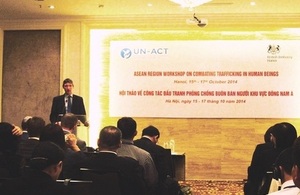UK calls for closer joint work in South East Asia to protect children from trafficking
Experts from Vietnam, UK, Cambodia, Thailand, Laos and Myanmar met recently in Vietnam to share their national expertise and to promote international co-operation in the fight against Human Trafficking.

UK Ambassador Mr Giles Lever opened the workshop
The British Embassy Hanoi, in collaboration with UN Action for Co-Operation Against Trafficking in Persons (UNACT) held a Combating Trafficking in Human Beings workshop for ASEAN member states in Hanoi, Vietnam, between 15th and 17th October 2014. Coincided with UK Anti Slavery Day on 18th October, the workshop also aimed to highlight the UK Government’s commitment to working with international partners to eradicate human trafficking.
The workshop, opened by the UK Ambassador Mr Giles Lever, brought together more than 100 human trafficking experts drawn from relevant government ministries, non-governmental organisations, intergovernmental organisations and foreign diplomatic missions.
Speakers at the workshop included counter –trafficking experts from the UK’s Home Office; National Crime Agency; the National Society for the Prevention of Cruelty to Children’s Child Trafficking Advice Centre as well as frontline practitioners from the ASEAN states present.
The event provided delegates with an opportunity to hear about the counter-trafficking experiences of the UK and ASEAN countries; build upon regional networks; and discuss ideas for increased collaborative working across borders. It was concluded that strong international partnerships and multi-agency working are vital to success.
The UK views Trafficking in Human Beings as a serious transnational crime and a form of modern-day slavery. We are committed to working with international partners to tackle it.
Further Background
The UK Government has introduced a Modern Slavery Bill, which is currently progressing through Parliament. It is the first of its kind in Europe. The Bill will provide law enforcement with stronger tools to stamp out modern slavery, ensure slave drivers and traffickers receive suitably severe punishments and enhance protection of and support for victims. It will also create an Anti-slavery Commissioner to drive an improved and coordinated law enforcement response to modern slavery, working in the interests of victims.
United Nations Action for Cooperation against Trafficking in Persons (UN-ACT) was established in 2014 to ensure a coordinated approach to more strategically and effectively combat trafficking in persons in the Greater Mekong Sub-region (GMS) and beyond. UN-ACT is currently supported by the governments of Norway and Sweden. The project builds upon the work previously undertaken by the United Nations Inter-Agency Project on Human Trafficking (UNIAP). https://www.un-act.org is their online resource centre.
The 2004 Memorandum of Understanding between the six Greater Mekong Sub-region countries – Cambodia, China, Laos, Myanmar, Thailand, and Vietnam - establishing what is known as the COMMIT Process, the Coordinated Mekong Ministerial Initiative Against Trafficking (COMMIT, 2004). The National Society for the Prevention of Cruelty to Children (NSPCC) Child Trafficking Advice Centre (CTAC) provide information and advice to those working with children who may have been trafficked into the UK. The NSPCC is a registered UK charity.
Quotes
Kip Gibbens attending UK expert from NSPCC’s Child Trafficking Advice Centre said:
Collaborative working across borders is absolutely key. This conference provided an invaluable opportunity to build relationships with those who have the opportunity to take action to stop children from being trafficked out of their home country and entering into a dangerous journey to the UK or other countries. The training CTAC assisted with at this conference, along with the further training we are planning to deliver in China and Vietnam will help us to further develop these relationships.
The closer we work together, the more information we share, the more effective we will be at investigating, preventing and protecting children from trafficking.